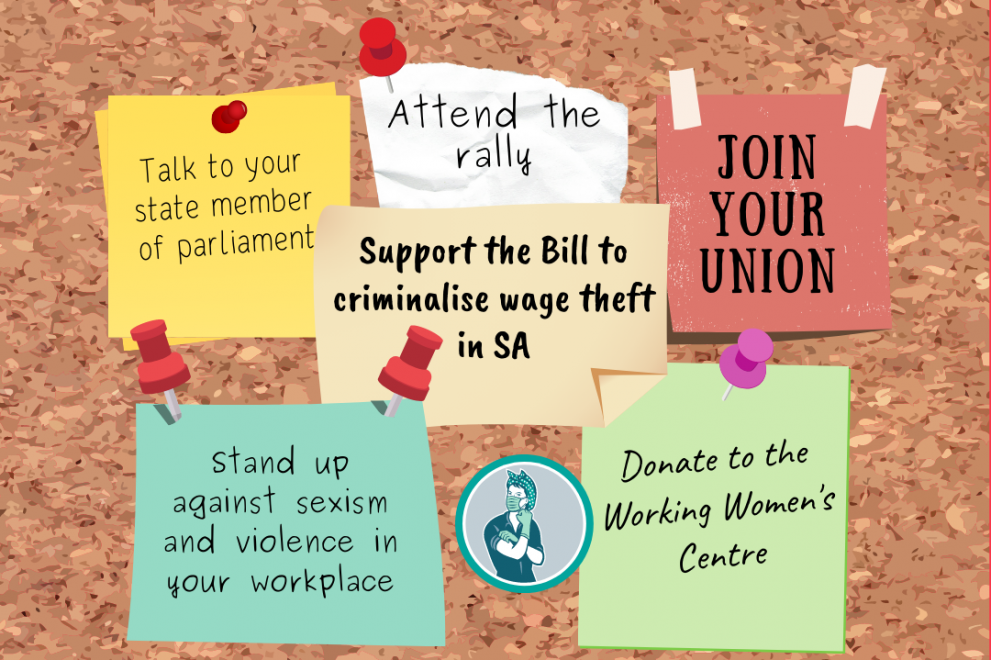Your cart is empty.


Your cart is empty.
In the first 12 years of their child’s life, most women’s careers, finances and ability to participate in the workplace is seriously undermined by the rolling inequities in law and public policy about parenting and family.
The Working Women’s Centre SA invites Professor Rae Cooper and Associate Professor Elizabeth Hill, two pre-eminent experts in the world of women, family, and work, to discuss how public policy and legislation effects women, work, and families.
We will discuss the big-ticket public policies that rule the first 12 years of parenting:
We are going to examine these public policies and laws and ask the following questions:
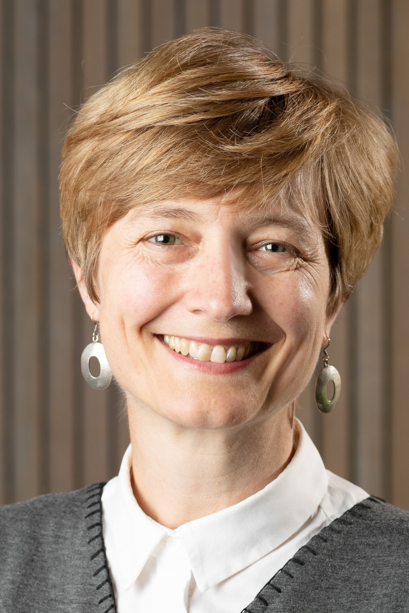
Associate Professor Elizabeth Hill
Elizabeth Hill is Associate Professor in political economy at The University of Sydney. Elizabeth is the Deputy Director of the new Gender Equality in Working Life Research Initiative at The University of Sydney and co-convenor of the Australian Work and Family Policy Roundtable. As a leading researcher on the future of women, work and care in Australia and the Asian region, she has collaborated on research into gender equality, work and care with leading national and international institutions, including the International Labour Organisation and UN Women. Elizabeth has served as a non-executive director on a number of non-profit Boards and is an experienced media commentator and advisor to government, unions, and business.
Her university webpage is https://www.sydney.edu.au/arts/about/our-people/academic-staff/elizabeth-hill.html
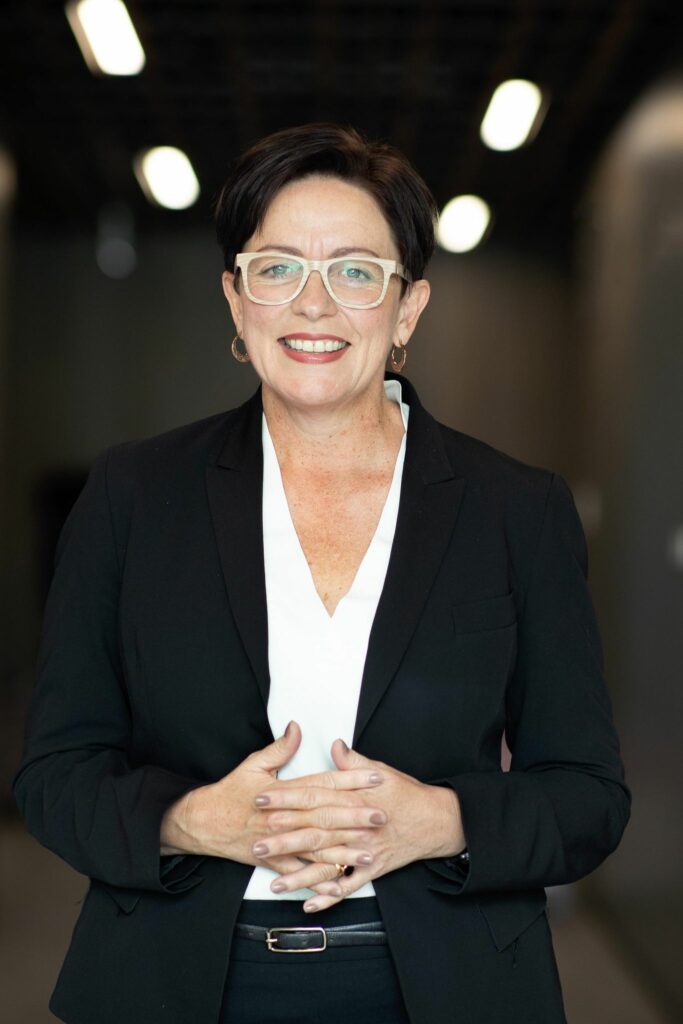
Professor Rae Cooper, AO
Rae is Professor of Gender, Work and Employment Relations at the University of Sydney Business School. She is Director of the newly formed University of Sydney Gender Equality in Working Life Research Initiative and is co-Director of the Women, Work and Leadership Research Group. Rae is President Elect of ILERA, is a past President and Executive member of AIRAANZ and is currently an editor of the Journal of Industrial Relations. Rae has published over 60 articles and chapters on industrial relations policy and legislation, trade unionism and collective bargaining, and women’s working lives. Her work has been funded by the Australian Research Council, state and federal government agencies, businesses and unions. Rae is known for her collaboration with labour market stakeholders having collaborated on research projects with key organisations including the AICD, ACTU, NSW Law Society, and the SDA. Rae has significant experience as a member of government and community sector boards and committees and has previously been a Director of the NSW TAFE Commission Board, Chair of the Board of Directors of Hearing Australia, Chair of the NSW Premier’s Expert Advisory Council on Women, and Chair of the NSW Working Women’s Centre. Rae was made an Officer of the Order of Australia in 2019 in recognition of her contributions to Australian higher education and workplace policy and practice.
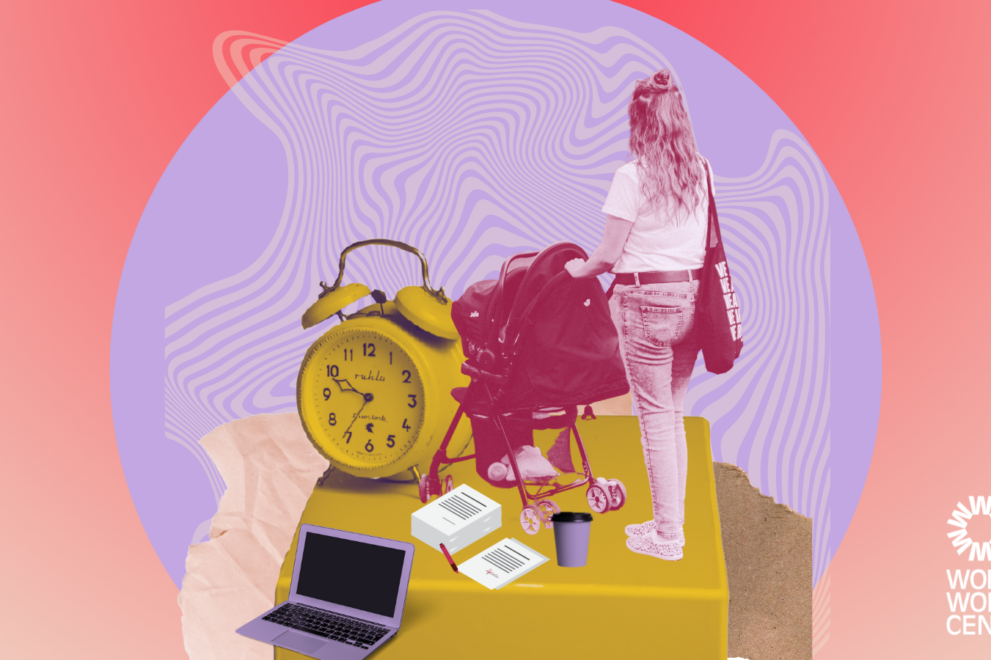
Appointments will be held at the Legal Advice Clinic – City West Campus on:
To make an appointment please telephone WWC SA on 8410 6499 or complete the online form at:
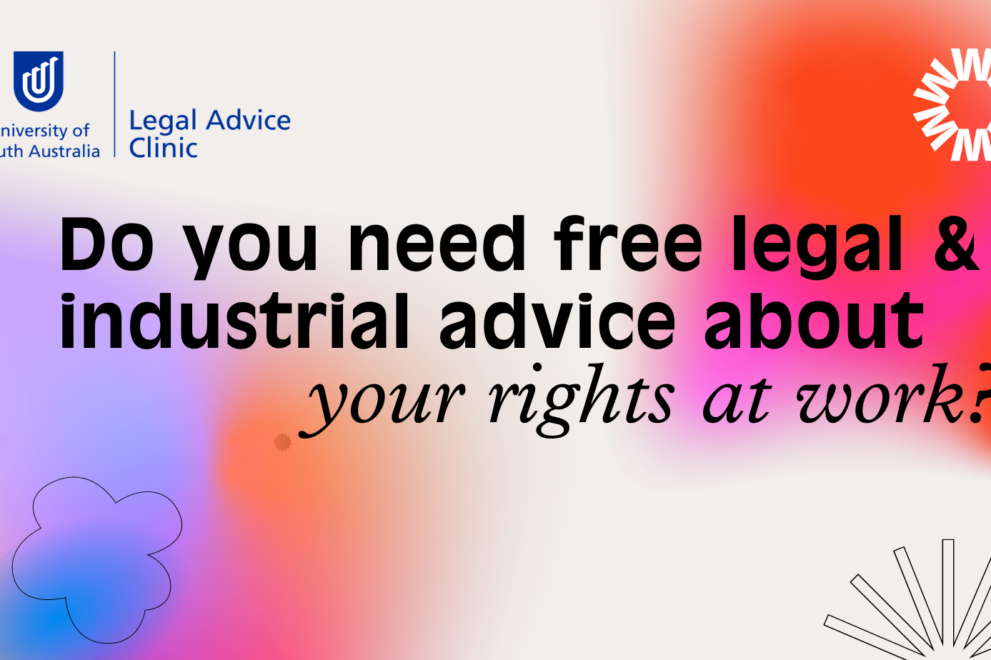
The Working Women’s Centre in collaboration with Fair Go SA, will co-host an educational workshop on worker’s rights and the Fair Work Act.
This will be followed by a confidential (one to one) advice clinic for any workers who need free industrial advice about work.
Our workshop will cover topics including:
At the Confidential Industrial Advice Clinic you can:
WHEN:
23 Jul 2021
2pm – 5pm
EVENT TYPE
Workshop
WHERE
69 Grote Street, Adelaide SA
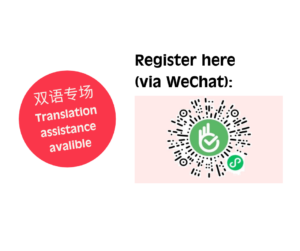
If you cannot register for this event via the We Chat QR code, please email to register: reception@wwc.org.au
Accessibility: Please note that this venue is not wheelchair accessible, there are volunteers who can assist with accessing the venue if required, but only upon request.
We acknowledge that this event is on Kaurna land and we pay our respect to the traditional custodians of the land, past and present. Sovereignty was never ceded.
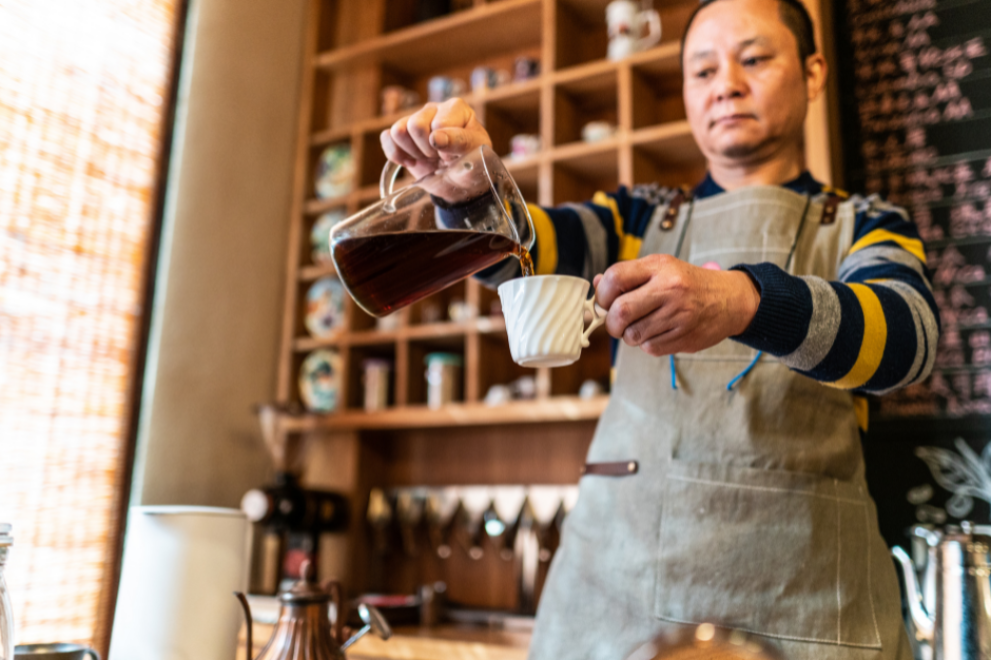
This story is about our fight to save the Working Women’s Centres in the NT and Queensland. It was published by The Saturday Paper on 22 May 2021.
Find the full story here.
Despite this month’s federal budget pledging $3.2 billion to women, a critical front-line service has lost much of its funding and will likely close before the end of the year.
This interview was published by The Wire May 13 2021.
Listen to the full interview on The Wire here.
In a bid to repair their relationship with the women of Australia, the Federal Government is committing $3.4 billion to improving women’s safety, economic security, and health and wellbeing.
Women’s organisations say far more funds are needed to address workplace sexual harassment and violence.
Meanwhile, advocates welcome long-awaited recognition of violence against women and girls with disabilities.

This article was published by Glam Adelaide 16 March 2021.
Read the full article and see the photo on Glam Adelaide’s Website
March participants congregated at midday in Victoria Square to hear speeches before heading down to North Terrace.
Hosted by March 4 Justice, the event championed inclusion, and people of all genders were in attendance.
“The March is not just for women. It’s for everyone who wants an end to gendered violence – people from all backgrounds are welcome,” they say.
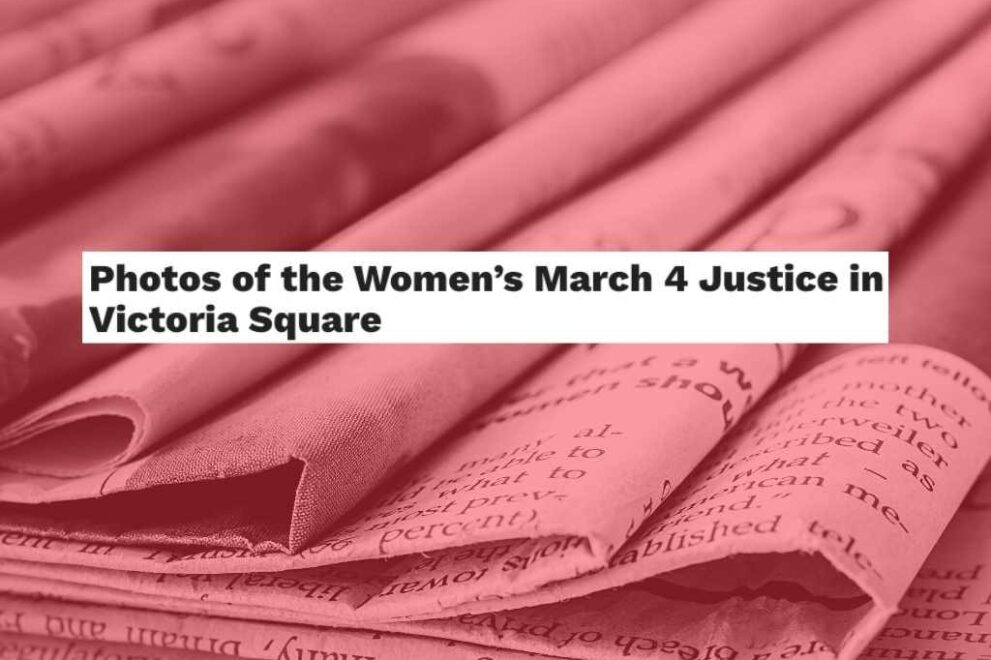
This article was published by Croaky May 12 2021.
Read the full article on Croaky’s website here
Introduction by Croakey: The “shocking global disparity” in access to vaccines remains one of the biggest risks to ending the pandemic, the World Health Organization’s Director-General warned this week.
Dr Tedros Adhanom Ghebreyesus said high and upper-middle income countries, representing 53 percent of the world’s population, have received 83 percent of the world’s vaccines.
By contrast, low and lower-middle income countries account for 47 percent of the world’s population but have received just 17 percent of the world’s vaccines.
Speaking to a media briefing on 10 May, Dr Tedros cautioned against complacency as the number of COVID-19 cases and deaths plateau globally, notwithstanding rapidly increasing cases numbers and deaths in the South-East Asia region.
“Any decline is welcome, but we have been here before,” he said. “Over the past year, many countries have experienced a declining trend in cases and deaths, have relaxed public health and social measures too quickly, and individuals have let down their guard, only for those hard-won gains to be lost.”
The WHO Foundation has launched a “Together for India” appeal to raise funds to support WHO’s work in India, including the purchase of oxygen, personal protective equipment and medicines.
Dr Tedros said the spread of variants, increased social mixing, the relaxation of public health and social measures and inequitable vaccination are all driving transmission.
“My message to leaders is, use every tool at your disposal to drive transmission down, right now,” he said.
“Even if your country has a downward trend, now is the time to surge your capacities. Even in countries with the highest vaccination rates, public health capacities must be strengthened to prepare for the possibility of vaccine-evading variants, and for future emergencies.”
Meanwhile, public health researcher Alison Barrett details some of the latest research news on COVID vaccination and useful vaccination resources in the latest edition of the COVID-19 wrap, as well as reporting on the pandemic’s impact on women.
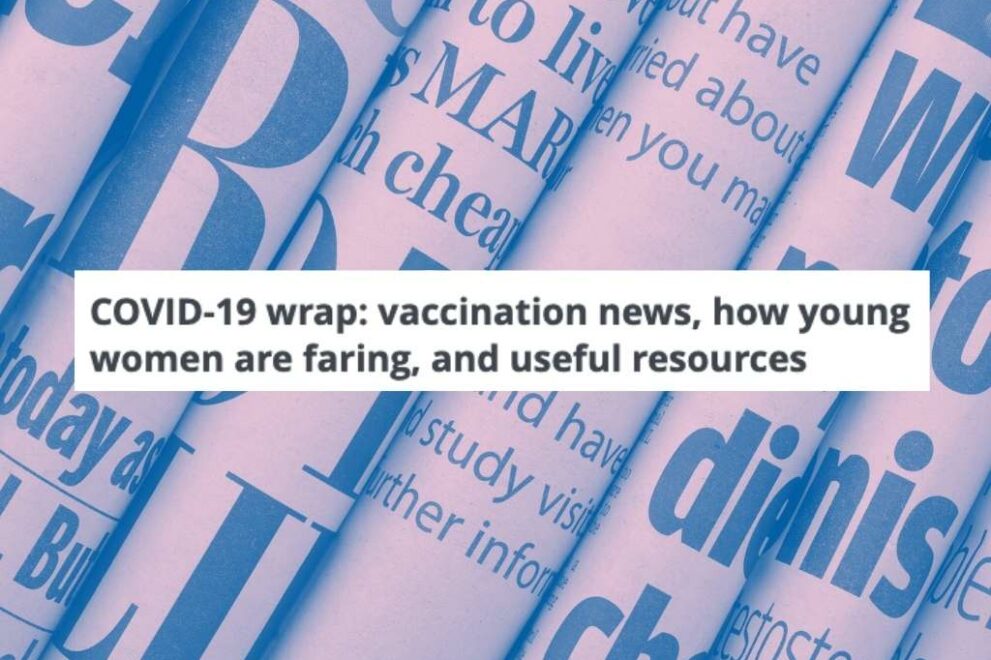
This article was published by City Mag May 10 2021.
Read the full article on CityMag’s website here
A report conducted by not-for-profit organisation Working Women’s Centre has found South Australian women were “disproportionally” impacted by the COVID-19 pandemic.
Between September 2020 and February 2021, the organisation collected written and online responses from 293 women, non-binary and genderqueer people under the age of 30. It found respondents were “hit hard” by the loss of work, increased pressure at work and home, and the mental health impacts of COVID-19.
The study revealed 44 per cent of respondents felt “discouraged” about the prospect of finding work, 48 per cent said they were “very worried” or “anxious” about money, a quarter had hours or pay reduced, and one in five lost their jobs.
This survey adds to the extensive media coverage and research conducted over the last year on how women have been disproportionately affected by the COVID-19 pandemic.
“WHAT CAN WE DO TO MAKE SURE THERE ARE BETTER OPPORTUNITIES HERE FOR SECURE WORK?”
— MADDIE SARRE
“The general mood that was conveyed to us by young women was very uncertain, and a lot of them spoke about being really worried about not being able to get work in the future,” Working Women’s Centre Youth Project Officer Maddie Sarre tells CityMag.
“Some of the main findings were that loss of work has been really huge for young women, because they are disproportionately working in a lot of the sectors that were impacted, also often employed casually, or in insecure work.
“But on the other hand, young women who are working in frontline sectors really faced increased pressure and stress. A lot of young women work in healthcare or in education, and about 40 per cent of those that responded to our survey said they were worried about getting COVID through their work, which I think takes a really big toll.”
Recently published ABS data shows women in the 20—34 age range accounted for 70 per cent of South Australia’s net female migration loss in 2019.
Although it’s been reported South Australia’s net interstate migration is at a 30-year high, the ABS data backing this claim shows South Australia is still consistently suffering a net loss in the 25—44 age range. (Though this data isn’t broken down by gender.)
Maddie says more research should be done to understand why this is occurring.
“We need to look into why are young people leaving,” she says, “and what can we do to make sure there are better opportunities here for secure work.”
Maddie says South Australia has “an opportunity right now”, as many of the young women surveyed by the Working Women’s Centre said they came back to South Australia “because of COVID”.
“It’s a real opportunity to retain those skills,” she says.
The WWC report includes four recommendations on how to improve outcomes for working women:
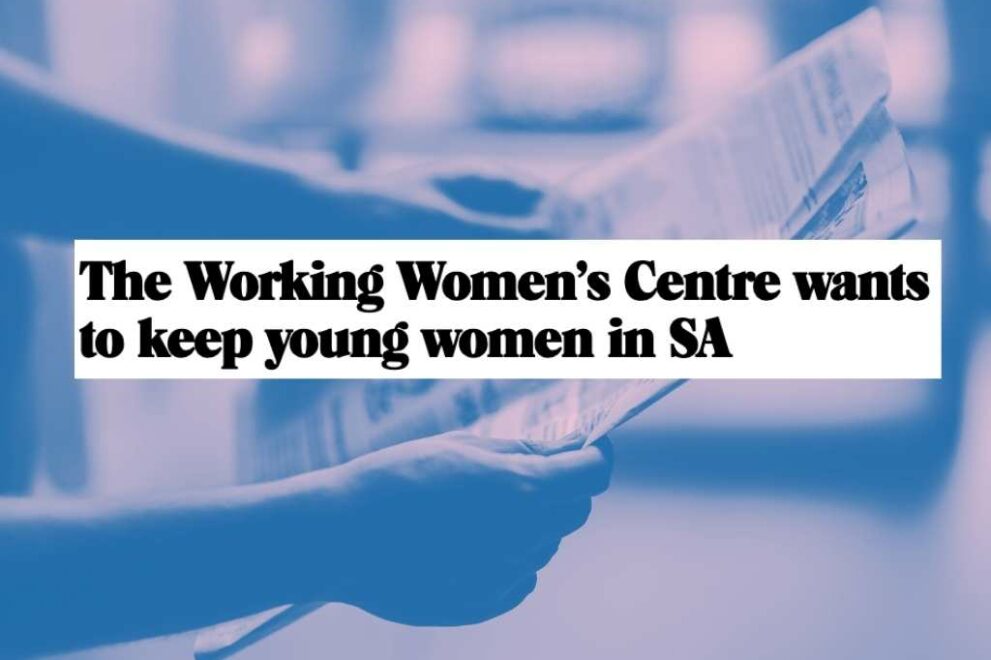
Young women’s recent brave advocacy for a safer future has focused national attention on the urgent need for systemic action. Brittany Higgins has come forward with an allegation that she was raped in Parliament House. Friends of a woman who has now died have spoken out about rape allegations against our country’s Attorney-General. Dhanya Mani has spoken up for a safer future and prioritising survivors after the woeful response to her allegation of indecent assault. Chanel Contos has called out rape culture in schools. Australian of the Year, Grace Tame, has spoken out about coverup culture and abuse of power.
Every single day survivors disclose violence to a system that doesn’t care enough to bring them justice.
Enough is enough.
Rape and other acts of gendered violence have profound, life-long consequences for survivors, often including physical disabilities and mental health conditions. Yet our prevention infrastructure and support services are not resourced to adequately support survivors’ safety. And systems too often fail to hold perpetrators to account.
We deserve better.
Our parliamentary leaders must treat all forms of gendered violence as seriously as other threats to community safety.
Political leaders must take decisive action to make parliaments a safe place for everyone. Including improving the rules governing political staffers and party members to prevent abuse, addressing inequality, providing accessible independent reporting avenues, and ensuring real accountability for misconduct. But action in this moment must extend beyond our parliaments.
There is also a crisis in our communities. Horrific violence is being perpetrated and enabled across the country – the result of a wider cultural and systemic problem that manifests in schools, workplaces, institutions and homes. For many, these drivers of violence are further enabled by intersecting power dynamics that increase barriers to a safer future. For Aboriginal and Torres Strait Islander women, resisting the ongoing impacts of colonisation and racism is inseparable from gender justice. Intersecting systems of power and oppression also increase barriers to safety for women from culturally and linguistically diverse backgrounds, women with disabilities, younger women, older women, women in institutional care, women in prison, women in insecure work, and trans and gender diverse people as they strive for safety and justice. Too often, impunity is the outcome.
It is the responsibility of governments to intervene in the systems that continue to enable violence. Survivors and community leaders are already working for a safer future – it’s time governments properly supported solutions, particularly the leadership and self-determination of First Nations communities.
There are clear pathways to a safer future. We demand the action from leaders needed to make it happen.
This must also include:
Prevention: Implement the full spectrum of long-term systemic prevention initiatives that can address the underlying causes of gendered violence, including sexism and intersecting forms of discrimination. Starting with comprehensive whole-of-school education programs.
Resourcing services and accountability mechanisms: Properly resource the specialist services that victim-survivors of gendered violence rely on to report, be safe and recover. Resource the mechanisms needed to hold perpetrators to account.
Law reform: Improve access to justice for victim-survivors of sexual assault through substantive and procedural law reform, and educate the workforce so responses are appropriate and trauma-informed.
Addressing workplace sexual harassment: Action all recommendations of last year’s Respect@Work: Sexual Harassment National Inquiry Report.
Anything else falls short, and is a decision to leave women in danger.
We must believe, support and listen to survivors, hold perpetrators accountable, and properly resource solutions to prevent gendered violence from occurring in the first place.
This article was published by City Mag 18 March 2021.
Listen to the full interview on The Wire here.
Recent cases instigating this public action include the alleged rape of former Liberal Party staffer Brittany Higgins by a colleague, and a historical 1988 rape accusation levelled at Attorney-General Christian Porter (which he denies).
From within the crowd, CityMag saw speeches in the Square, before protesters marched to Parliament House and back. The first speaker was Kaurna and Wirangu woman Rosemary Wanganeen.
Rosemary tells the crowd colonisation and the “Western patriarchal construct” created the “greater potential” for society’s male elite “to live in privilege”.
“Those living in a society with a Western patriarchal and colonised mindset depend on us as women to fall into a rabbit warren of hopelessness, in the hope that believing is all too hard. But we’re not going to do that, are we?” Rosemary says. The crowd responds: “No”.
“We are going to keep making noise,” Rosemary continues, “and yes, we’re going to get emotional.”
CityMag speaks to a number of protesters while the speeches rage on, including a 67-year-old “survivor of sexual assault”, who we’ve chosen not to name.
She says while working in the corporate world she’d “seen a lot” in terms of sexual harassment. “Enough is enough,” she says.
In another group of protesters, we meet Barbara and Quintin McIntyre. We ask why they’re here. Barbara breaks into tears. Quintin, her husband, answers: “[Barbara] told me before that she wants things to change so her granddaughters don’t go through what she went through.
“You don’t need another review. You need things to actually change.”
Barrister Clare O’Connor also spoke at the event, saying this national effort was spurred on by the last three weeks of “disgusting information” emanating from Canberra, and government leaders need to commit to reform.
“There’s been a very, very good inquiry with 55 recommendations that came down from the Human Rights Commission. It explained how to make a workplace safe,” she says, referring to the Respect@Work report.
“We need to demand action from our politicians in relation to these things. We need to demand action in relation to those workers who are protected, those who do not have to be investigated – those parliamentarians in Canberra. Why are they above the law?”
South Australia has been in the throes of its own toxic parliamentary issues, with the publication of the Acting Equal Opportunity Commissioner’s recent report into parliament finding sexual harassment “prevalent” and “the problem and its solutions sit at an organisational and cultural level”.
The report includes 16 recommendations aiming to prevent and appropriately handle sexual and discriminatory harassment in this particular workplace, however the document reiterates sexism will only really be eliminated “through concerted efforts to create cultural change”.
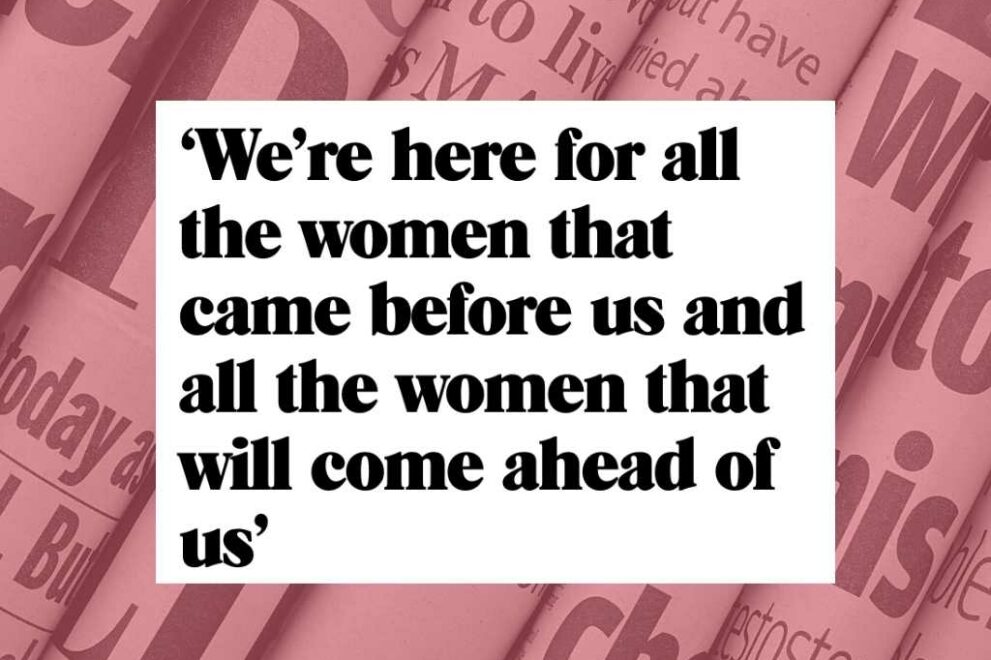
This interview was published by InDaily Monday March 15 2021
Read the full article on InDaily here.
The crowd of mostly women gathered on the steps of Victoria Square to the sound of John Farnham’s You’re The Voice with placards warning “I’m angry”, “enough is enough”, “no Porter in the house” and “we believe you Brittany”.
They then marched down King William Street towards Parliament House chanting “justice for women now” and “we will not be silenced”, before heading back to Victoria Square.
Among the protestors were SA politicians including SA Best MLC Connie Bonaros and Opposition Leader Peter Malinauskas, and human rights barrister Claire O’Connor SC.
The inaugural Adelaide March4Justice event, which started at noon, coincided with 35 protests across Australia, including in every capital city and many regional centres.
The protests supported a national march in Canberra, where a petition was delivered calling on Prime Minister Scott Morrison to act on gendered violence against women, including female Members of Parliament and staff.
The Adelaide protestors joined an estimated 100,000 people across the country calling for independent investigations into all cases of sexual harassment and assault.
South Australian protestors also called for SA Parliament to fully implement all 16 recommendations made in the Equal Opportunity Commission’s recent damning review into sexual harassment in State Parliament.
The protest’s co-organiser Dr Samantha Battams told reporters the review’s findings were not surprising.
“Women are silenced about these things – they don’t often speak up and tell their friends and family because they actually fear the consequences,” she said.
“We have already seen that with some of the national cases where women have lost their jobs.”
Barrister Claire O’Connor SC said she was the victim of violence and harassment in her workplace.
She said “every woman is here because she knows and she has experienced the pain and suffering that comes from being treated unfairly in the worksite, being treated unfairly in the home, being the victim of sexual assault and knowing that our voice doesn’t matter”.
“Enough is enough of the culture of not listening, not acting and blaming. That’s why we’re here.”
Former Federal Liberal staffer Chelsey Potter, who survived an alleged sexual assault by another former colleague in 2015, attended the Adelaide march.
She told InDaily that today was a “crucial moment for women in this country”.
“It’s actually quite emotional to feel that every woman has stood up and said ‘yeah this has happened to me’, or ‘I know someone this has happened to or you know what? I just don’t want this to happen anymore’,” she said.
“That’s an incredible thing – I’ve never actually witnessed something like this before and it’s a credit to Brittany Higgins and all the women who have stood up and said something.”
Potter said she hoped today would be “the beginning of an era where women will start calling assault and harassment out”.
Today is not the start of the social movement, but it is the start of a new notion and a new movement in Australia
She said there was was “no way” that politicians could ignore the protests happening across the country.
“They’re doing a very good job of trying to – particularly in not attending the march and I’m hoping there will be a minute to midnight change for government MPs, particularly for Coalition women to attend the march,” she said.
“I do feel like there’s no way but forward now.
“There certainly can’t be anymore ignorance on the issue, there certainly can’t be any more closed doors meetings, it has to be a conversation with women.”
The protest also heard from Kaurna and Arabunna woman Janette Milera, who organised the Black Lives Matter protest in Adelaide last year.
“Our women have been fighting the colonial white men from the day of colonisation,” she said.
“Our women have been raped, they have been taken and stolen and made as sex slaves since colonisation.
“We all need a change as women because this man’s law that we live under, it doesn’t work for any of us.”
One protestor, who InDaily has chosen not to name, held a sign that read: “Hear me rage. Justice for rape victims”.
“I’ve been raped and sexually abused four times in my life,” she said.
“I’ve reported it to police on four different occasions and… I haven’t taken it to court because of the damage it will do to me and my family.
“I haven’t been able to let out my rage and this is about me settling into my power and rage.”
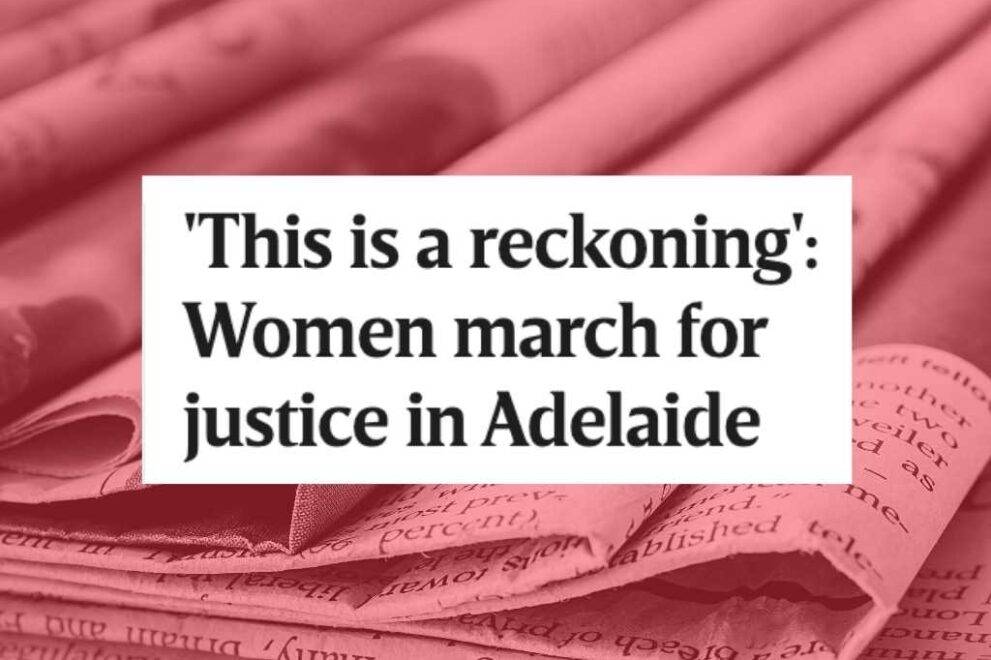
The shocking video that many people saw earlier this week is unfortunately a familiar story of wage theft and gendered workplace violence that is common in our South Australian workplaces. Now that a spotlight has been put on the issue, we have the opportunity to change things for the better.
